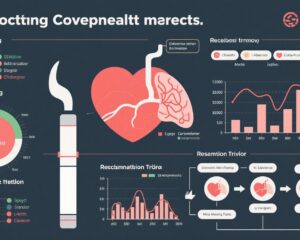Highlight
1. Cytisinicline demonstrated significantly higher continuous abstinence rates at both 6 and 12 weeks compared to placebo in adults seeking smoking cessation.
2. The effect of cytisinicline extended to 24 weeks, indicating durable clinical benefits beyond treatment cessation.
3. Cytisinicline markedly reduced nicotine craving scores compared with placebo, supporting its mechanism as a partial agonist at α4β2 nicotinic acetylcholine receptors.
4. The treatment was well tolerated without serious treatment-related adverse events, affirming safety in the smoking population.
Study Background and Disease Burden
Tobacco dependence remains a leading cause of premature morbidity and mortality worldwide, contributing substantially to cardiovascular, respiratory, and neoplastic diseases. Despite various approved pharmacotherapies available to aid smoking cessation, success rates are limited by adverse effects, tolerability, and relapse. Cytisinicline, a plant-derived alkaloid, acts as a partial agonist at α4β2 nicotinic acetylcholine receptors implicated in nicotine addiction pathways, offering a novel intervention for tobacco dependence. Initial trials, including a prior US study, showed promising cessation efficacy, but replication and extended evidence on its mechanism and safety were warranted to strengthen clinical adoption.
Study Design
The ORCA-3 was a multicenter, randomized, double-blind, placebo-controlled phase 3 replication trial conducted at 20 US sites between January 2022 and March 2023. The study enrolled adults aged approximately 52 years who smoked at least 10 cigarettes daily and were motivated to quit. Participants (n=792) were randomized in a 1:1:1 ratio into three arms: 3 mg cytisinicline thrice daily for 12 weeks; 3 mg cytisinicline thrice daily for 6 weeks followed by placebo for 6 weeks; and placebo thrice daily for 12 weeks. All subjects received behavioral support. The follow-up period extended to 24 weeks post-treatment to assess sustained abstinence. The primary endpoint was biochemically validated continuous abstinence (carbon monoxide <10 ppm) during the last 4 weeks of treatment. Secondary endpoints included abstinence from end of treatment to 24 weeks and changes in nicotine craving assessed by the Questionnaire of Smoking Urges. Safety outcomes encompassed treatment-emergent adverse events.
Key Findings
Of the randomized participants, 79.3% completed the trial. The cytisinicline groups exhibited significantly higher rates of continuous abstinence compared to placebo at both treatment durations.
Figure 1 Odds of sustained abstinence for cytisinicline vs placebo by COPD status. COPD, chronic obstructive pulmonary disease.
During weeks 3 to 6, 14.8% of the 6-week cytisinicline group maintained abstinence versus 6.0% in placebo (OR 2.9; 95% CI, 1.5-5.6; P < .001). For the 12-week regimen, continuous abstinence during weeks 9 to 12 was 30.3% vs 9.4% for cytisinicline versus placebo (OR 4.4; 95% CI, 2.6-7.3; P < .001).
Long-term abstinence rates from weeks 3 to 24 were 6.8% (6-week cytisinicline) vs 1.1% (placebo), and from weeks 9 to 24 were 20.5% (12-week cytisinicline) vs 4.2% (placebo), indicating sustained clinical benefit.
| Continuous smoking abstinence* n (%) | Treatment group comparisons | ||||||
| Placebo | 6-week cytisinicline | 12-week cytisinicline | 6-week cytisinicline vs placebo | 12-week cytisinicline vs placebo | |||
| OR (95% CI) | P value† | OR (95% CI) | P value† | ||||
| Weeks 3–6‡ | |||||||
| COPD (n=145) | 1/47 (2.1%) | 17/98 (17.3%) | 9.65 (1.24 to 75.0) | 0.0302 | |||
| Non-COPD (n=1453) | 27/489 (5.5%) | 187/968 (19.3%) | 4.10 (2.69 to 6.24) | <0.0001 | |||
| Weeks 9–12§ | |||||||
| COPD (n=100) | 2/47 (4.3%) | 9/47 (19.1%) | 5.33 (1.08 to 26.23) | 0.0396 | |||
| Non-COPD (n=970) | 42/489 (8.6) | 159/487 (32.6%) | 5.16 (3.57 to 7.46) | <0.0001 | |||
Nicotine craving scores decreased significantly more in cytisinicline-treated groups at week 6 compared to placebo (-15.2 points vs -12.0 points; P < .001), suggesting mitigation of craving as a treatment mechanism.
The safety profile was favorable; no serious treatment-related adverse events occurred, and tolerability was consistent across regimens.
Expert Commentary
This replication phase 3 trial confirms and extends prior data supporting cytisinicline as an effective and well-tolerated pharmacotherapy for smoking cessation. The significant reduction in nicotine craving aligns with its pharmacodynamic profile as a partial agonist at the α4β2 receptors, which modulate dopaminergic reward circuits implicated in tobacco addiction.
Compared to existing cessation aids such as varenicline, cytisinicline shows competitive efficacy with potentially a more favorable tolerability profile, although direct head-to-head comparisons are warranted. The trial’s rigorous design, multisite enrollment, and extended 24-week follow-up enhance generalizability and clinical relevance.
Limitations include the relatively modest abstinence rates typical of smoking cessation pharmacotherapy and the absence of biomarker data beyond carbon monoxide verification. Behavioral support as a co-intervention was standardized but could influence real-world applicability.
Conclusion
The ORCA phase 3 replication trial substantiates cytisinicline’s role as a novel, efficacious, and safe option for tobacco cessation. Treatment durations of both 6 and 12 weeks were effective, with sustained benefits through 24 weeks. Cytisinicline’s ability to mitigate nicotine craving offers mechanistic insight and potential therapeutic advantage. These findings support wider clinical adoption and incorporation into smoking cessation guidelines, addressing the unmet need for diverse cessation pharmacotherapies.
References
Rigotti NA, Benowitz NL, Prochaska JJ, Rubinstein M, Clarke A, Blumenstein B, Cain DF, Jacobs C. Cytisinicline for Smoking Cessation: The ORCA Phase 3 Replication Randomized Clinical Trial. JAMA Intern Med. 2025 Jun 1;185(6):648-655. doi: 10.1001/jamainternmed.2025.0628 IF: 23.3 Q1 . PMID: 40257755 IF: 23.3 Q1 ; PMCID: PMC12012700 IF: 23.3 Q1 .



